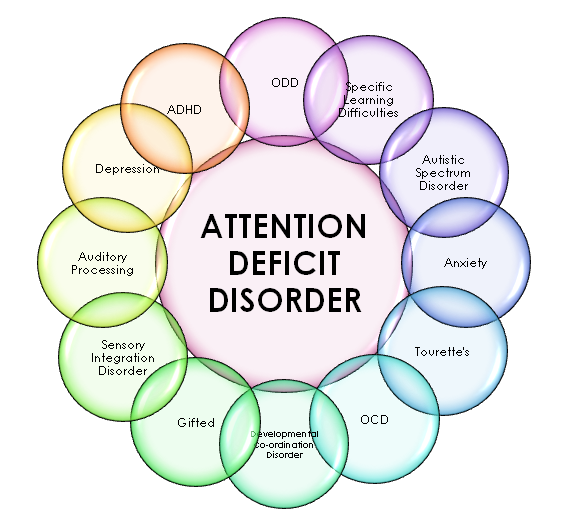Attention Deficit Disorder

Many neurodevelopmental conditions can often exist together, but each can be treated in different ways. The picture below illustrates how the conditions overlap. Please use the drop down menu to view other conditions.
What Is Attention Deficit Disorder?
Attention Deficit Disorder (ADD) is a term used for people who have excessive difficulties with concentration without the presence of other ADHD symptoms such as excessive impulsiveness or hyperactivity. The official term from the Diagnostic and Statistical Manual IV is “ADHD of the predominantly inattentive type.” However in practice ADD is a much more appropriate term.
ADD is more common in girls but it can occur quite often in boys also.
Some children with ADD are also impulsive but have never been hyperactive. This impulsiveness can adversely affect their social skills interaction.
Occasionally a child with ADD is so demoralised, so anxious and depressed or self-harming, that these are seen as being the key issues rather than the underlying concentration weakness.
ADD has a very different presentation from the hyperactive impulsive type of ADHD but it frequently co-occurs within the same family, with some children of the family having ADHD and some ADD.
How Is ADD Diagnosed?
A diagnosis of ADD is a clinical diagnosis where the clinician is satisfied that there is excessive difficulty with the majority of the inattentive ADD criteria. These criteria need to be problematic at both home and school on an ongoing basis, to be significant and causing impairment, and there needs to be no other better explanation for the child or adult’s inattentiveness.
The diagnostic criteria:
- Often does not give close attention to details or makes careless mistakes in schoolwork, work, or other activities.
- Often has trouble keeping attention on tasks or play activities.
- Often does not seem to listen when spoken to directly.
- Often has trouble organizing activities.
- Often avoids, dislikes, or doesn’t want to do things that take a lot of mental effort for a long period of time (such as schoolwork or homework).
- Often loses things needed for tasks and activities (e.g. toys, school assignments, pencils, books, or tools).
- Often does not follow instructions and fails to finish schoolwork,
- Is often easily distracted.
- Is often forgetful in daily activities.
One of the key features of the inattentive group is daydreaming. This is distractibility into one’s own thoughts. It must be differentiated from petit mal epilepsy although this is usually very clinically obvious.
To make a diagnosis, feedback must be obtained from the school, from previous school reports, and from clinical observation and a careful history from the family.
What Is The Treatment For ADD?
Educational strategies are always important for children with ADD. The awareness of the teachers, cues to help the child refocus, keeping lessons as bright and interesting as possible in short spells of concentration is helpful. The child should be sat towards the front of the class. However in children with significant ADD, educational strategies alone usually prove insufficient.
The use of low-dose long-acting psychostimulant medication in children with ADD has a very high success rate. In the lowest or the second lowest dose of each of these medications there is usually an improvement in focus and concentration. Such medications are well tolerated, are effective in about 95% of children treated, and whilst they may have some occasional short-term side effects such as appetite suppression or sleep difficulty, generally they are very well tolerated with no evidence of long-term side effects. The use of medication is always for an initial therapeutic trial and improvement is seen within half an hour of the correct dose being obtained.



